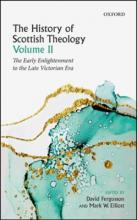David A. S. Fergusson and Mark W. Elliott, eds., The History of Scottish Theology, Volume II: From the Early Enlightenment to the Late Victorian Era (Oxford: Oxford University Press, 2019)
Fergusson, David A. S., and Mark W. Elliott, editors. The History of Scottish Theology, Volume II: From the Early Enlightenment to the Late Victorian Era. Oxford: Oxford University Press, 2019
This three-volume work comprises over eighty essays surveying the history of Scottish theology from the early middle ages onwards. Written by an international team of scholars, the collection provides the most comprehensive review yet of the theological movements, figures, and themes that have shaped Scottish culture and exercised a significant influence in other parts of the world. Attention is given to different traditions and to the dispersion of Scottish theology through exile, migration, and missionary activity.
The volumes present in diachronic perspective the theologies that have flourished in Scotland from early monasticism until the end of the twentieth century. The History of Scottish Theology, Volume I covers the period from the appearance of Christianity around the time of Columba to the era of Reformed Orthodoxy in the seventeenth century. Volume II begins with the early Enlightenment and concludes in late Victorian Scotland. Volume III explores the 'long twentieth century'. Recurrent themes and challenges are assessed, but also new currents and theological movements that arose through Renaissance humanism, Reformation teaching, federal theology, the Scottish Enlightenment, evangelicalism, mission, biblical criticism, idealist philosophy, dialectical theology, and existentialism. Chapters also consider the Scots Catholic colleges in Europe, Gaelic women writers, philosophical scepticism, the dialogue with science, and the reception of theology in liturgy, hymnody, art, literature, architecture, and stained glass. Contributors also discuss the treatment of theological themes in Scottish literature.
Volume II: From the Early Enlightenment to the Late Victorian Era
This second volume in The History of Scottish Theology comprises 29 essays ranging from the early Enlightenment to the end of the ‘long nineteenth century’. Attention is devoted to key doctrinal and apologetic themes relating to the inheritance of Reformed orthodoxy and the appearance of deism, as well as to newer challenges and revisionist approaches that later emerged. The extent to which the mid eighteenth-century scholars of the Church of Scotland were committed to the movement that later became known as ‘the Scottish Enlightenment’ is discussed by several contributors who explore the importance of Moderate and Evangelical trends. The influence of nineteenth-century continental developments, including kenotic Christology, idealism, and biblical criticism, is also registered, alongside exploration of the issues raised by religious scepticism, slavery, and the natural sciences. Several essays are devoted to describing the wider dissemination and refraction of theological ideas in Gaelic women’s poetry, Scottish literature, liturgical reform, preaching, hymn writing, and civic architecture. The international influence of Scottish theology is also described, both through the work of important thinkers who migrated to the USA and in the establishment of Scots colleges in Europe.
Items in bold explicitly engage Torrance.
1. "The Significance of the Westminster Confession," Donald Macleod, 1-13
2. "Between Orthodoxy and Enlightenment," Paul Helm, 14-26
3. "Jonathan Edwards and his Scottish Contemporaries," Jonathan Yeager, 27-41
4. "Early Enlightenment Shifts," Christian Maurer, 42-55
5. "Philosophy and Theology in the Mid-Eighteenth Century," Thomas Ahnert, 56-68
6. "Moderate Theology and Preaching c.1750–1800," Stewart J. Brown, 69-83
7. "Eighteenth-Century Evangelicalism," John R. McIntosh, 84-98
8. "Reformed Theology in Gaelic Women’s Poetry and Song," Anne Macleod Hill, 99-111
9. "Literate Piety," James Foster, 112-126
10. "Dissenting Theology from the 1720s to the 1840s," David Bebbington, 127-140
11. "The Influence of the Scots Colleges in Paris, Rome, and Spain," Tom McInally, 141-154
12. "Catholic Thought in the Late Eighteenth Century," Raymond McCluskey, 155-169
13. "Natural and Revealed Theology in Hill and Chalmers," Mark W. Elliott, 170-185
14. "Theology, Slavery, and Abolition 1756–1848," Iain Whyte, 186-198
15. "Scottish Literature in a Time of Change," Ian Campbell, 199-212
16. "The Calvinist Paradox in Eighteenth- and Nineteenth-Century Literature," Alison M. Jack, 213-227
17. "New Trends: Erskine of Linlathen, Irving, and McLeod Campbell," Andrew Purves, 228-241
18. "Free Church Theology 1843–1900," Michael Bräutigam, 242-264
19. "Episcopalian Theology 1689–c.1900," Rowan Strong, 265-283
20. "Scottish Theology in Nineteenth-Century Ireland," Andrew R. Holmes, 284-300
21. "Hume amongst the Theologians," David Fergusson, 301-313
22. "The Borthwick Sisters," Frances M. Henderson, 314-328
23. "The Liturgical Revolution," Bryan D. Spinks, 329-341
24. "Biblical Criticism in the Nineteenth Century," William Johnstone, 342-358
25. "As Open as Possible," William Storrar, 359-375
26. "The Secession and United Presbyterian Churches," Eric G. McKimmon, 376-389
27. "Extra-Terrestrials and the Heavens in Nineteenth-Century Theology," Colin Kidd, 390-403
28. "The Reception of Darwin," David Fergusson, 404-418
29. "Liberal, Broad Church, and Reforming Influences in the Late Nineteenth Century," Finlay A. J. Macdonald, 419-431
Index of Names
Thomas F. Torrance: 84, 86, 232
- 41 views

